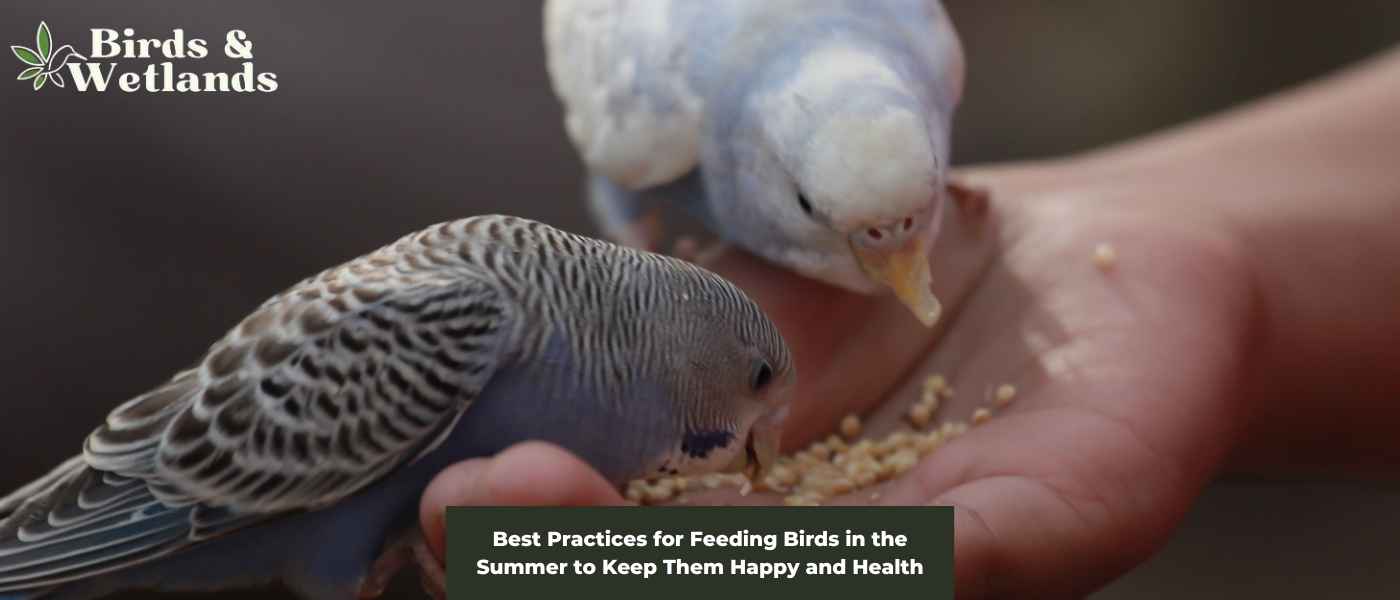When feeding birds in the summer, provide fresh, dry seed to prevent fungal or bacterial growth. Offer a water source for drinking and bathing, but clean it regularly. Foods rich in protein like mealworms can support nesting birds. Avoid suet or other foods that can spoil in the heat. Regularly clean feeders to prevent disease spread. Place feeders in shaded, quiet areas, safe from predators. If bear activity is a concern, remove feeders at night.
Key Takeaways On Feeding Birds In The Summer
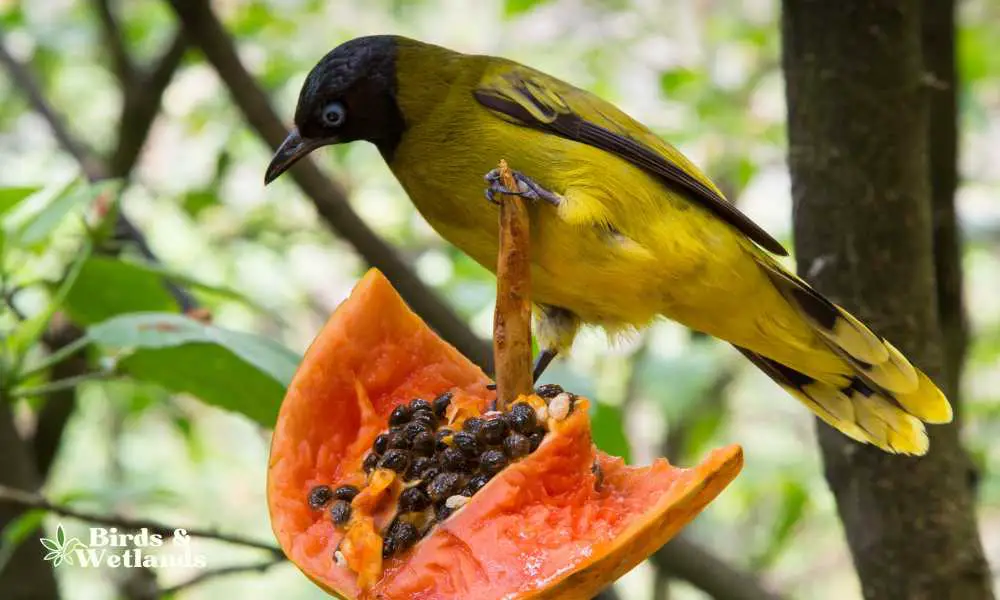
Best Practices for Feeding Birds in the Summer
Feeding birds in the summer requires some different considerations compared to other times of the year. Here are some best practices to ensure that you’re helping and not harming your local birds:
- Offer Suitable Food: During summer months, birds often enjoy fresh fruit, such as melon rinds or grapes cut in half. Berries or chopped up apples and oranges can also be attractive. You can also offer seed mixes that include sunflower seeds, safflower seeds, and millet. However, remember that different bird species have different diets, so what’s appropriate will depend on which birds live in your area.
- Clean Feeders Regularly: Summer heat can make bird feeders a breeding ground for bacteria and mold, which can harm birds. Regularly clean your bird feeders, ideally once a week. Be sure to dry them thoroughly before refilling to discourage mold growth.
- Keep an Eye on Fresh Food: Unlike seeds, fresh fruits and other perishable foods can spoil quickly in the summer heat. If you offer these foods, be sure to check them regularly and remove any spoiled food.
- Provide Water: Fresh water is especially important for birds during the hot summer months. Provide a birdbath, a water dish, or a dripping hose for birds to drink from and bathe in. Be sure to change the water daily to keep it fresh and to deter mosquitos from breeding.
- Place Feeders in a Shaded Area: Placing bird feeders in a shady spot can help keep the food fresh for longer, and birds will appreciate a cooler place to eat.
- Consider the Breeding Season: Keep in mind that many birds have young in the spring and summer. Avoid foods that can be a choking hazard for young birds, like whole peanuts.
- Avoid Chemicals: If you’re gardening in your yard, avoid using pesticides or other chemicals that could harm the birds. Birds will not only eat from your feeders, but also forage for insects and other food in the yard.
Remember, feeding birds is a commitment. If you plan to start, be ready to keep up with regular feeder maintenance, especially during the summer when high temperatures can cause rapid spoilage of food and water.
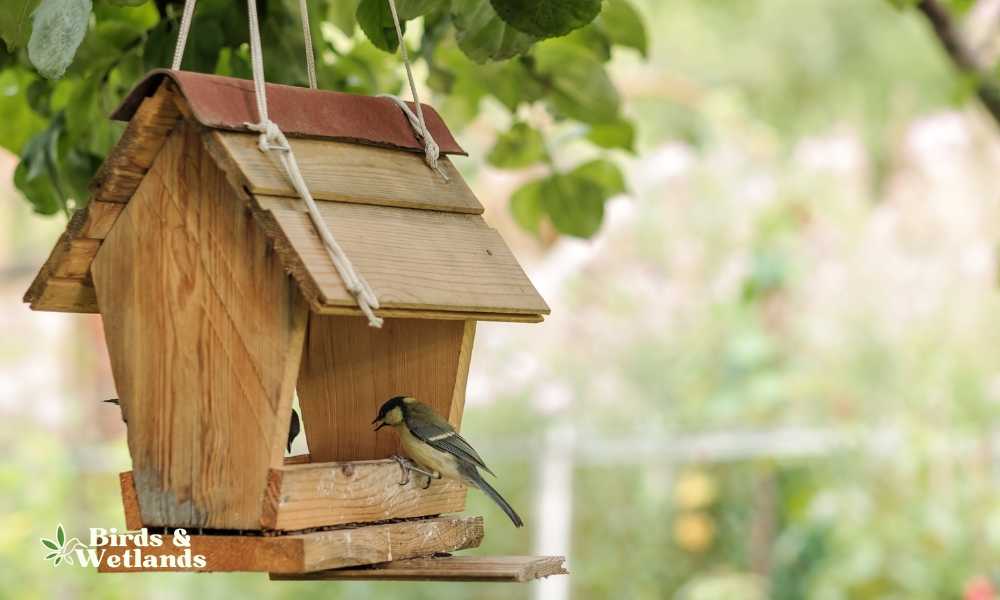
Why is summer a great time to feed birds?
Summer is a fantastic time to feed adult and young birds for several reasons. First, during this season, backyard birds are busy breeding and raising their young, and they need a reliable source of food to provide for their offspring. By providing food for birds in your backyard or garden, you can help them find the necessary energy and nutrients to thrive.
Another reason why summer is an excellent time to feed birds is that many of their natural food sources, such as insects and seeds, can become scarce or difficult to find during this time of the year. Drought and heat waves can affect plants and insects, leading to fewer available resources for birds. Providing a steady supply of bird food can ensure that they can easily access the necessary nutrition they need to survive.
Moreover, feeding birds during the summer can help you enjoy their beauty and diversity up close. Many bird species are more active and visible during the summer months, making it an ideal time to observe and appreciate them.
By putting out bird feeders or bird baths, you can attract a range of birds to your backyard, including colorful finches, hummingbirds, and other summer migrants.
However, it’s important to note that offering birds food should be done responsibly to ensure healthy growth. You should choose the right type of bird food, provide fresh water, and regularly clean feeders to prevent the spread of disease.
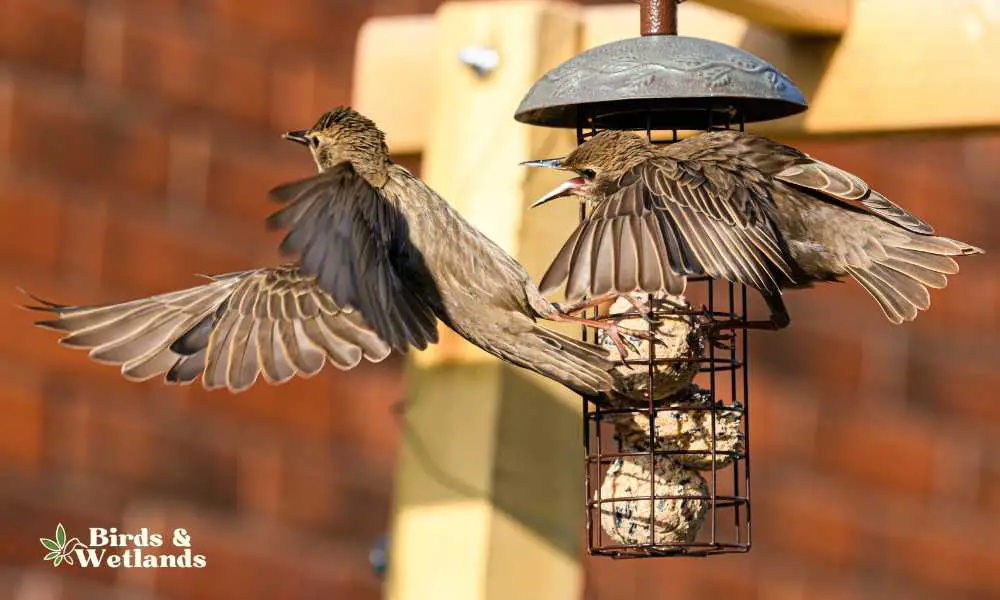
What foods to avoid feeding birds in the summer?
Feeding birds during the summer can be a great way to attract beautiful and colorful species to your backyard. However, not all human foods are suitable for birds, and some can even harm their health. Here is an outline of some foods to avoid feeding birds during the summer:
- Salty Foods: Birds need very little salt in their diets, and excessive salt can lead to dehydration and other health problems. Avoid feeding them any food that is high in salt content, such as chips, coated nuts, crackers, and pretzels.
- Chocolate: While humans may love chocolate, it is toxic to birds and can cause seizures, heart failure, and even death. So, never feed birds chocolate or any chocolate-containing foods like chocolate chips, cookies, and cakes.
- Avocado: Although a healthy and nutritious fruit for humans, avocado contains persin, a toxin that can be fatal to birds. So, avoid feeding birds avocados or any foods that contain avocado, such as guacamole.
- Milk and Dairy: Birds are lactose intolerant and cannot digest milk and other dairy products. So, avoid feeding them any cheese, yogurt, or other dairy products.
- Bread: While bread is not harmful to birds, it is not very nutritious, and feeding them too much can lead to malnourishment. So, if you do give them bread, make sure it’s not the only thing they are eating.
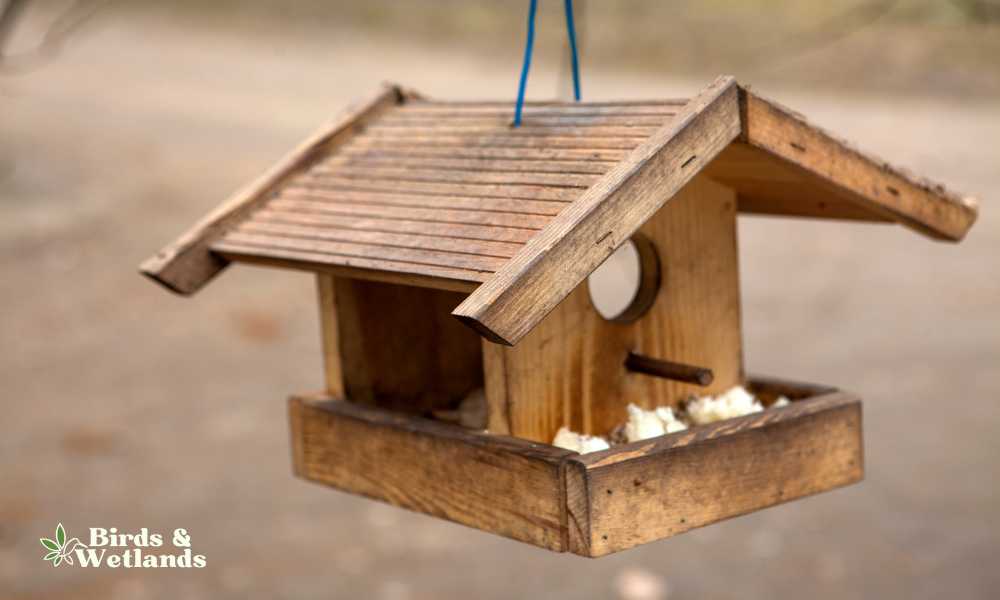
When to feed birds suet
Suet is best fed to birds during the colder months of fall and winter. It’s a high-energy, high-fat food that provides birds with the calories and nutrients they need to maintain their body heat. However, suet can melt or spoil in high temperatures, making it less suitable for feeding birds in the spring and summer. If you wish to offer suet in warmer months, consider commercial no-melt suet cakes specifically designed for this purpose.
Wild Bird Copper Suet Feeder
A Must-Have for Bird Lovers
- Triple Capacity: Hold up to 3 cakes or a large brick for continuous bird feeding.
- User-Friendly: The EZ Fill design ensures effortless reloading of bird feed.
- Weather-Proof: Its unique roof design keeps feed dry, ensuring birds can feast in any weather.
- Comfort-First Design: The vinyl coating prevents birds’ feet from freezing in winter or burning in summer.
How to help birds in the summer
Most wild birds don’t need help in the summer, but they will not say no if you offer them food and water. To attract feeding birds in summer to backyard birders try the following:
Serve fresh fruit
Serving fresh fruit during summer can benefit birds in many ways. Birds need various nutrients and minerals to maintain their health, and fresh fruit can provide many of these essential elements.
Fresh fruits are some of the best summer bird foods offering hydration during the hot summer months. Birds must avoid dehydration, and fresh fruits like watermelon, grapes, and berries can provide them with the necessary fluids to stay hydrated.
Fruits are an excellent source of vitamins and minerals for birds to stay healthy. For instance, fruits like apples, pears, and bananas provide birds with essential nutrients like vitamin C and potassium.
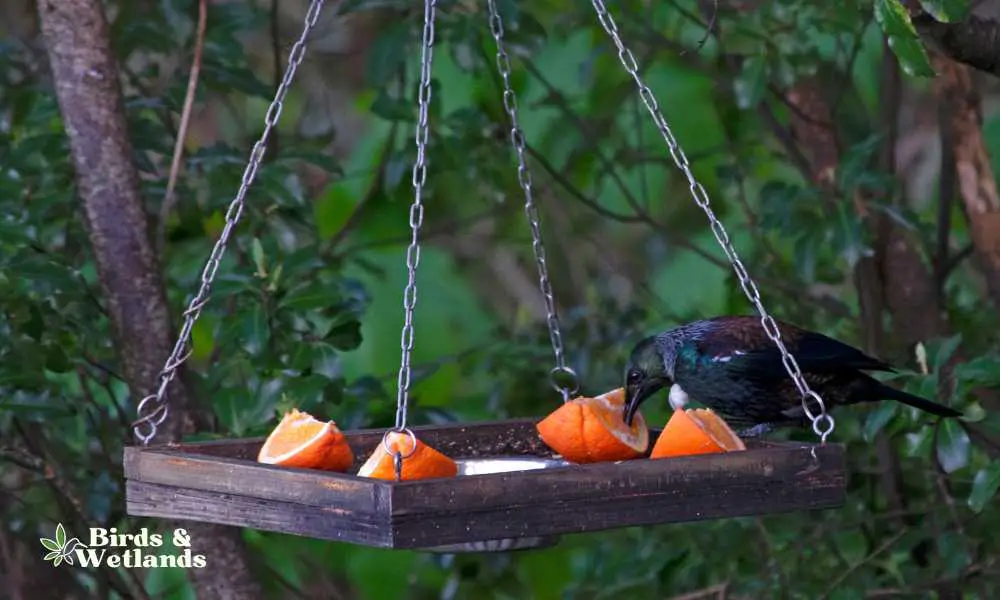
Birds need a lot of energy during the summer months, and fresh fruit can give them the carbohydrates they need to maintain their energy levels. Fruits like grapes and berries are high in natural sugars, giving birds a quick energy boost.
Serving fresh fruit as sweet treat can also be an excellent way to attract birds to your backyard. Many birds, especially fruit-eating species like orioles, gray catbirds and tanagers, will be drawn to yards with fresh fruit available. You can put orange halves or grape jelly in a platform feeder or fill a suet cage near other feeders.
It’s important to note that when serving fresh fruit to birds, it’s essential to ensure the fruit is ripe and fresh. Overripe or spoiled fruit can attract unwanted pests and other animals, and foster bacteria, which can harm birds. So if you want to attract orioles and other berry-eating birds, use fresh fruits and other nutritious treats.
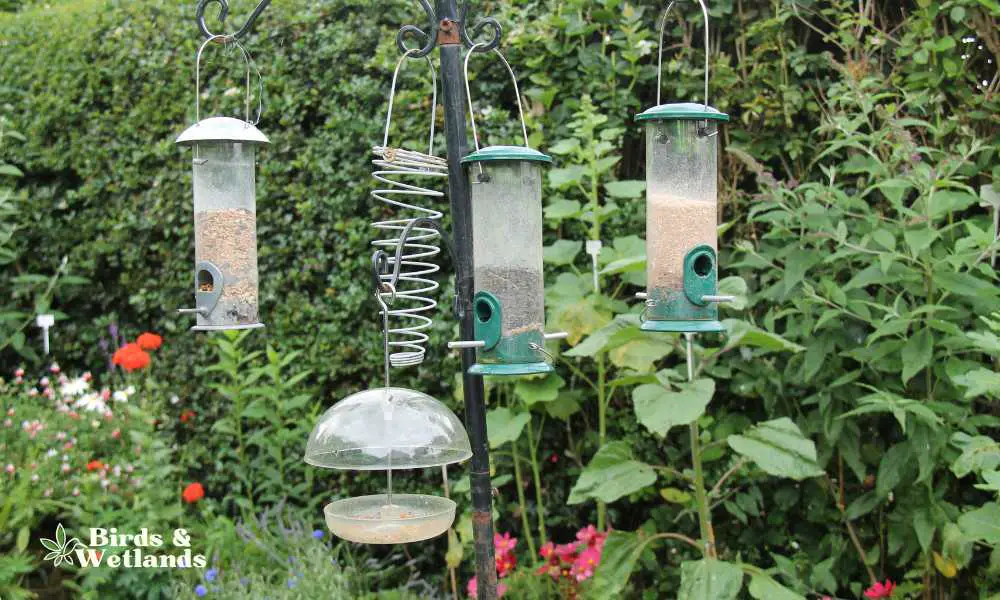
Add a fresh water source
You can put bird baths in your yard to attract feeding birds in summer. A clean water source can help different birds stay hydrated. In hot weather, birds can lose water rapidly. Without access to clean water, they can quickly become dehydrated.
Placing a bird bath in your yard or garden can give birds a place to bathe, helping them stay comfortable and clean. Bathing is an essential activity for birds that helps them to cool down and regulate their body temperature against the summer heat.
Varied flock of birds not only drink water but also use it for other activities, such as cleaning their beaks and feathers and softening their food. By providing a fresh water source, birds can access the water they need to perform these essential activities.
Bird baths can attract birds to your backyard. This can enhance your overall birdwatching experience and allow you to see more bird species in your backyard.
It’s important to keep the water clean and fresh to prevent any harmful buildup of bacteria or other contaminants. A bird bath or a shallow dish with fresh water that is changed daily is typically sufficient.
Sunnydaze 2-Tier Arcade Solar Fountain
A Blend of Sophistication and Sustainability
The Sunnydaze 45-Inch 2-Tier Arcade Solar Fountain brings elegance to your garden or patio with its solar-powered, LED-lit design and easy-to-install structure
Pros
- Provides an elegant water feature measuring 23″ in diameter x 45″ in height, and a recommended water capacity of 3 gallons for a serene and continuous flow.
- Built with durable resin and fiberglass, ensuring a long-lasting water fountain that can withstand various weather conditions.
- Comes as a complete set including a solar panel with rechargeable battery pack, a compatible submersible water pump, and a 16′ power cord for easy installation and placement in any convenient location.
- Powered by sunlight, eliminating the need for unsightly extension cords. The solar panel also charges throughout the day, allowing the fountain to operate during cloudy or nighttime conditions.
Cons
- Being solar-powered, its functioning might be impaired during long periods of cloudy or rainy weather.
- Given its size and height, the fountain might not be suitable for small gardens or patios.
Limited to 3-gallon water capacity
Hang a sugar-water feeder
Hummingbirds are regular visitors to backyards and gardens with nectar feeders filled with sugar water or nectar, even in the summer. These little birds are primarily attracted to the sweet smell of the sugar water.
When setting up a hummingbird feeder, it’s important to keep it clean and well-maintained to prevent the growth of mold and bacteria, which can harm adult birds.
The bird feeder should also be placed in a visible, open area, away from windows and other obstacles, to prevent collisions and allow the birds to easily find the food source.
/hum
Additional Tips on Summer bird feeding
- Homemade Suet cakes can go bad quickly in the summer heat so take your suet feeders down during this time. Any spoiled food can harm feeder birds. Softened suet can hurt a bird’s feathers.
- If you really want to offer birds suet, make sure to choose a no-melt packaged suet.
- Scatter sunflower seed mixes and cracked corn to your tray feeders to attract ground-feeding birds.
- Dried mealworms and dried crickets in backyard feeders can attract insect eating birds such as the eastern bluebird and other birds and help them feed their hungry nestlings.
- Birds consume nuts even in the summer. If you want to attract woodpeckers and more birds, consider putting feeders filled with nuts out.
- Keep your seed feeders stocked with mixed seed, sunflower seeds and other foods to attract grosbeaks.
- It’s only natural to see fewer birds in early summer. Don’t worry and be patient, summer is also a rewarding season.
- Position your feeders away from windows to protect birds.
- Fill your feeders halfway through the summer to avoid them getting bad.
- Persistent birders should keep their cats indoors to avoid frightening birds away from platform feeders.
- Keep your seed dry to avoid molds.

